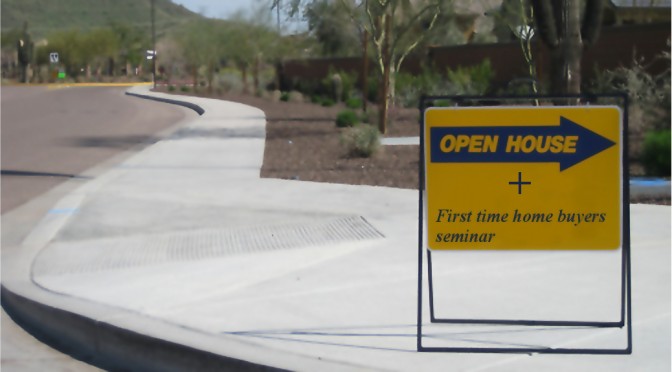by David Depman
More than half of potential first-time home buyer clients are afraid to call you.
You and the process you represent fill them with enough fear of rejection that they don’t even try to contact you, even though they want a mortgage. It’s a crazy truth in this business.
 To first-timers the process of buying a home is incomparable to almost anything they’ve done before, and they are scared. Just over half (56%) of all buyers who don’t own a home today, but want to, say they’re not pursuing it because they fear they won’t qualify for a loan. 56%!
To first-timers the process of buying a home is incomparable to almost anything they’ve done before, and they are scared. Just over half (56%) of all buyers who don’t own a home today, but want to, say they’re not pursuing it because they fear they won’t qualify for a loan. 56%!
Loan Officers who understand this see this as a huge opportunity, and they are actively using first time home buyer marketing techniques to get face-to-face with these people. They are figuring out how to get them off the sidelines and into a home. In this article we focus on first-time homebuyer seminars.
Teaching them to become clients
Home buying seminars led by loan officers are the perfect balance of permission marketing and educating first-time buyers. It’s about handling their fears, understanding their uncertainty, engaging with them directly and offering your mortgage advice as an incentive to connect.
The last J.D. Power 2014 U.S. Primary Mortgage Origination Satisfaction Study released in November found that 43 percent of first-time home buyers indicate they do not completely understand the process, and only 48 percent of first-time buyers planned to schedule a meeting with their local lender for personalized advice. Plus according to this recent Wells Fargo survey they definitely need some. One key highlight of that survey found that 64% of respondents said they understood how much down payment is needed to buy a home, and yet 44% believed that amount was 20% down!
What’s in it for me?
Organizing a first-time home-buyers’ seminar benefits both you and your audience. Aside from helping people with an education in buying their first home, you’ll gain the confidence of the people — the people who want to learn about what you know, and what you can offer. They’ll give you their trust, and when you deliver value and education to them, they’ll come to you first for advice. You’ll be in a position to offer a product that suits their needs. And if one of your competitors has the same or a similar product, you’ll be the one that started them out, giving you a big advantage over your rival.
And even if none of the attendees become customers in the short term, the word of mouth promotion that you will gain will be sure to benefit you.
If you organize it they will come
One of the key things to keep in mind when organizing a seminar is knowing your audience. According to the National Association of Realtors© the average age of a first-time home buyer in the last year, and pretty much the last ten years, was 31 years old. This gives you the opportunity to use the right style of marketing and approach when putting together your seminar.
You should also consider that not every attendee will be ready to purchase a home now. Another highlight from the Wells Fargo survey we mentioned earlier found that more than half of millennials (ages 18-34) had a “rainy day fund”, and would be in position to purchase in the near future. These individuals may not be clients of yours today, but if you meet them and put them on a path to achieving their goal, they will be more likely to reach out to you in the future when they are ready.
Now that you have your audience in mind, here are some things to consider when creating your content for your presentation:
- Drafting a home buyers plan
- Overview of purchasing different types of homes (house, condo, townhouse, etc…)
- Home buying terminology
- Advantages of having a mortgage versus renting
- Preparing to apply for a mortgage: what do you need?
- Hidden fees and taxes in purchasing and owning a property
- Closing the deal
This is isn’t the be-all and end-all of home buyer seminar topics. After all, the lecture will end up being only half of the seminar. You’ll find that your audience will come with enough questions that it will fill up the other half. Don’t be afraid if someone comes at you with a question that you can’t answer immediately in the seminar, you will be able to address it in your follow up email. (Make sure that you collected everyone’s contact details before the seminar starts).
Choose your location well
Try to pick a place to host your event that makes your audience feel welcome. One suggestion is to co-promote the event with a realtor and host it in a house that’s for sale; the realtor may like the idea of having some serious people come to visit, and the two of you will get some serioius time together as well. No matter where you decide to hold it, make sure it’s somewhere pleasant where you won’t be distracted. Holding it at a local restaurant or bar, unless you have the place to yourselves, is not recommended.
Another thing to keep in mind is that according to the NAR around 92 percent of buyers use the internet in some way in their home search. This means there is always the option of hosting the seminar online using web conferencing tools. The advantage is that you can appeal to a wider geographical area, though face-to-face is still recommended in gaining personal confidence. If you are interested in hosting the seminar online you can check out this article about the best services to use.
Need more ideas?
If you’d like to see some example flyers from other seminars or an online course organized by the Virginia Housing Development Authority you can click on the links provided.
If you’d like to see more articles on marketing techniques to get first-time home-buyers through the door, make sure to subscribe!

